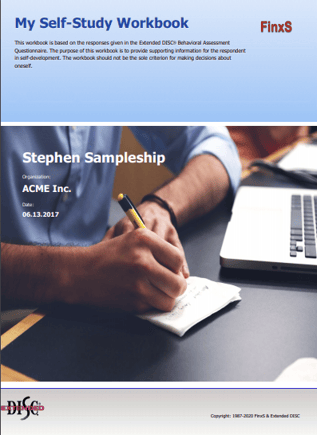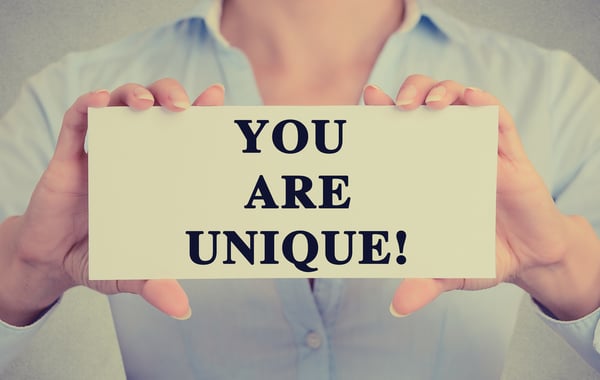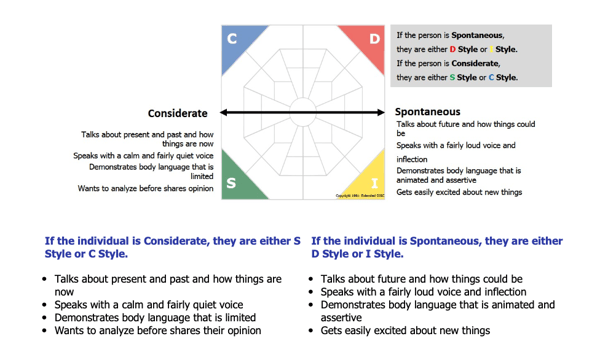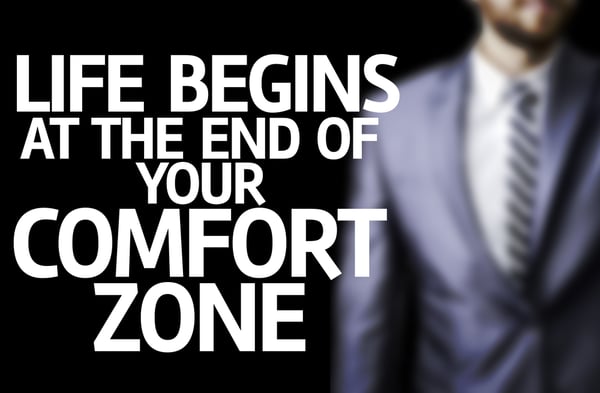How can a self-study workbook, based on your DISC style, help you build on your success?
My Self-Study Workbook
 My Self-Study Workbook is a practical, user-friendly, self-guided tool to help you in your journey to self-improvement. This self-paced workbook helps you create a clear and personalized development plan to build confident self-awareness.
My Self-Study Workbook is a practical, user-friendly, self-guided tool to help you in your journey to self-improvement. This self-paced workbook helps you create a clear and personalized development plan to build confident self-awareness.
It has information about you based on your Extended DISC® Analysis Questionnaire. It also explains the background theory on why you focus on these specific areas. Most importantly, it helps guide you to building a behavioral action plan to improve your interactions.
Remote employees, people in transition or career planning, those seeking professional and personal development, and pre-work and self-paced work for training participants are just some types of people who would benefit from such a tool. It is particularly relevant, given the recent workplace and lifestyle changes we are currently facing.
Uniquely you
 You have a preferred way of doing things. People you interact with may have a different way from you; they see the world differently. They may prefer another type of approach and therefore, they may not respond to your approach the way you wanted them to. DISC helps you understand how you are similar and different from others, and how you tend to come across to others. This valuable information can help guide you to better interactions and ultimately, more success.
You have a preferred way of doing things. People you interact with may have a different way from you; they see the world differently. They may prefer another type of approach and therefore, they may not respond to your approach the way you wanted them to. DISC helps you understand how you are similar and different from others, and how you tend to come across to others. This valuable information can help guide you to better interactions and ultimately, more success.
Imagine if everyone had the same view as you, or you never challenge your own opinion; you'd never develop or see the full scope of a situation. Ask other people, "why do you see the world the way you do?" It's like all the brides who want to get married in the perfect white wedding dress. We know they don't all want the same white wedding dresses; some want lace and others want satin, but all are perfect for the particular bride.
Not only are we all unique, but we also all have constant opportunities to make ourselves better human beings. This journey begins by understanding the strengths and weaknesses in your behavior and by accepting their existence; and ultimately, accepting who you are.
The Extended DISC® Model

The workbook provides an easy-to-use version of the Extended DISC® Diamond that focuses on the four main areas. The four main areas are Active, Reserved, Considerate, and Spontaneous.
Combining the "Considerate - Spontaneous" and "Task-oriented - People-oriented" continuums together forms the basis of the Extended DISC® Diamond. The Diamond consists of 160 different combinations of behavioral preferences. In each of the traits, one of the four main behavioral traits is strongest, having its place in D, I, S or C quadrant.
Essentially, the Diamond helps you understand your behavioral tendencies, including your strengths, and provides a starting point for self-development.
Understanding your unique behavioral strengths
You have certain qualities that help you succeed in life, both in business and personal. Concurrently, you have certain people and situations you find to be more challenging. Your perceived strengths and challenges are interrelated.
In some cases, your weakness is simply an overuse of a strength to the point it becomes a hindrance to your success. Since your behavioral strengths typically do not take added energy or conscious thought, you may not be aware you're overusing a strength. Understanding your strengths can help you maximize them, as well as avoid overusing them.
Avoiding the "success trap"
 Have you ever become a little too comfortable or set in your routines? You've probably heard someone say, "hey, it's working for me so I'm going to keep on doing it the same way." However, you are successful until you are not. If you don't know when to adjust, at some point you will need to, you'll fall into the "success trap". The "success trap" essentially happens when we rest on our laurels and believe past successes are indicators of future successes.
Have you ever become a little too comfortable or set in your routines? You've probably heard someone say, "hey, it's working for me so I'm going to keep on doing it the same way." However, you are successful until you are not. If you don't know when to adjust, at some point you will need to, you'll fall into the "success trap". The "success trap" essentially happens when we rest on our laurels and believe past successes are indicators of future successes.
For example, think about how you solve problems. You may have become good at solving problems a certain way. However, it is not only important to solve a problem, but to understand the different ways to solve it and the potential consequences for each solution. If you were to try solving problems the same way every time, you may never develop your full potential and at some point, your method may not work.
So, what's the secret to people who continue to succeed and routinely avoid the "success trap"? Successful people have something in common. They have a keen sense of who they are; in their strengths and in their development areas. In addition, they know how to adjust their behavioral style effectively. Successful people understand that there is more than one way to do things well.
Understanding why you do what you do is equally important to actually doing it successfully, and sometimes that means moving outside your comfort zone.
Moving outside your comfort zone
 Do you tend to do things that are harder for you first or are you more inclined to do the ones that you are more comfortable with? Doing things within your comfort zone don't take energy; however, doing things outside of your comfort zone takes more energy and can stress you out. You may put them off or even avoid them because we don't want to fail or be wrong.
Do you tend to do things that are harder for you first or are you more inclined to do the ones that you are more comfortable with? Doing things within your comfort zone don't take energy; however, doing things outside of your comfort zone takes more energy and can stress you out. You may put them off or even avoid them because we don't want to fail or be wrong.
You may not learn as much staying within your comfort zone; around people who are just like you. Change and success often requires you to do things that feel difficult. This can be energy consuming, stressful and sometimes unpleasant. You are more likely to be challenged and develop if you interact with people who are different from you, but it's not easy and often times, not comfortable.
Do you prefer spending time with like-minded people who share your views and opinions? Who doesn't want to feel good about what you do and have your opinions reinforced, right? It's usually easier to work with people who have similar skills and experiences as you do. It may even feel intimidating to work with or hire a person who is better than you are in some important aspect, but the complementing styles you have may help you perform better. Others may have different approaches to things that can help you understand the situation better and create more success for everyone.
The good news is, with awareness and practice, you may find that certain tasks will no longer drain your energy as much as they used to. Using DISC and your Self-Study Workbook, gives you a place to start and the confidence to know how to do it.
Getting started with the Self-Study Workbook
Don't be intimidated by the size of the Workbook; you don't need to tackle it all at once! Your first approach should be to read the introduction and the theory sections. It may not sound exciting, but understanding the 4 Quadrant Model, the four behavioral traits (D, I, S and C), and the Extended DISC® Diamond helps you fully utilize the rest of the workbook.
You do not need to review the rest of the workbook in any particular order. Jump around and focus on sections that are more relevant to you at this time and come back to the other sections later. Try working on one section at a time. Don't forget to take a break before going to the next one. You will want to have time to process what you've worked on. Try asking yourself questions like, "how can I apply what I just worked on to my real world?" This will help you to check for applicability and be ready to focus and get the most out of the next section.
After you have worked through the rest of the workbook, do the last two sections, "Do you want to change something in your behavior?" and "Personal Action Plan".
Let's take a closer look at understanding your results.
Understanding your results
This workbook is not designed to make you read from beginning to end. Once you've gone through the introduction and DISC theory, the rest of this workbook focuses on your results. Your results are mirrored against the different aspects of your daily work life.
Remember, all feedback in this workbook is the result of your answers to the Extended DISC® Behavioral Analysis Questionnaire. They are a description of how a person with the same DISC style as you typically behaves and is seen by other people.
Give yourself time to read everything thoroughly and process your results; think of yourself as you process the results and take notes. Think of it as your work in progress; you can always go back and revise as your situations and goals change.
Asking yourself the right questions
 Before you start, think about specific areas in your life you consider challenging at the moment. Are there certain things you would like to challenge yourself to do now? Lastly, what specific areas are you wanting to focus on to succeed in your career or in the near future?
Before you start, think about specific areas in your life you consider challenging at the moment. Are there certain things you would like to challenge yourself to do now? Lastly, what specific areas are you wanting to focus on to succeed in your career or in the near future?
Alternately, you may have already given special focus on developing certain aspects of your behavior, thus extending your flexibility zone from what it naturally would be. We all have behaviors or habits that we are not fully happy with. Sometimes, we may think, "I hope I could be more ..." or "I hope I would not always...".
It may be that going through this workbook brings up some of those development needs, or it may help you realize something you had not thought about before. Think about how you behave in that situation and consider if you need different and more effective approaches. Does your behavior differ when you are full of energy and in a good mood, as compared to being tired, angry or frustrated?
From an overall perspective, consider how to connect the feedback you received in this workbook to your own life. Do not just say, "yes, this is true," but find real and specific examples from your life when it happened. Was that the best possible behavior in that situation? Do not skip the parts you do not like or just say, "no, this is not me". Instead, ask yourself, "why was this included in my report?"
You are in control
 Maps provide us with a starting point; a frame of reference to make smart decisions as to where we need to go next. Extended DISC® is similar to a map; it provides you with a framework to help you to make the necessary adjustments at the individual, team and organizational levels to achieve your objectives. You may already have set personal goals and have asked yourself many questions. Now, you have more information on which direction to take and you control how to get there.
Maps provide us with a starting point; a frame of reference to make smart decisions as to where we need to go next. Extended DISC® is similar to a map; it provides you with a framework to help you to make the necessary adjustments at the individual, team and organizational levels to achieve your objectives. You may already have set personal goals and have asked yourself many questions. Now, you have more information on which direction to take and you control how to get there.
If you need to, ask people who know you for feedback; ask them to read and comment on your report. This helps you to identify your blinds spots, "I didn't realize this is how I come across to others." Give yourself some time to process the information if you need it.
We encourage you to regularly come back to the workbook and, especially, to your notes. The Self-Study Workbook, like the title implies, involves thought and effort on your part. You are using this workbook because you want to improve something in your behavior - become a better you. You determine any course of action based on your results. Ultimately, you are in control.
What's next?
 Research has clearly proven we tend to repeat the same behavioral patterns. Changing things that have become easy and spontaneous for you does not happen overnight.
Research has clearly proven we tend to repeat the same behavioral patterns. Changing things that have become easy and spontaneous for you does not happen overnight.
This workbook was designed to give a you a general understanding of who you are, how you are different and unique from others, and how you behave in different everyday situations. We hope you find this workbook useful in your journey to understanding yourself better and to help you become an even better you. The overall goal of your efforts is to develop yourself further, increase your productivity, and keep reaching for new goals. Take the time it takes because you are worth it!
Are you interested in taking this to the next level?

